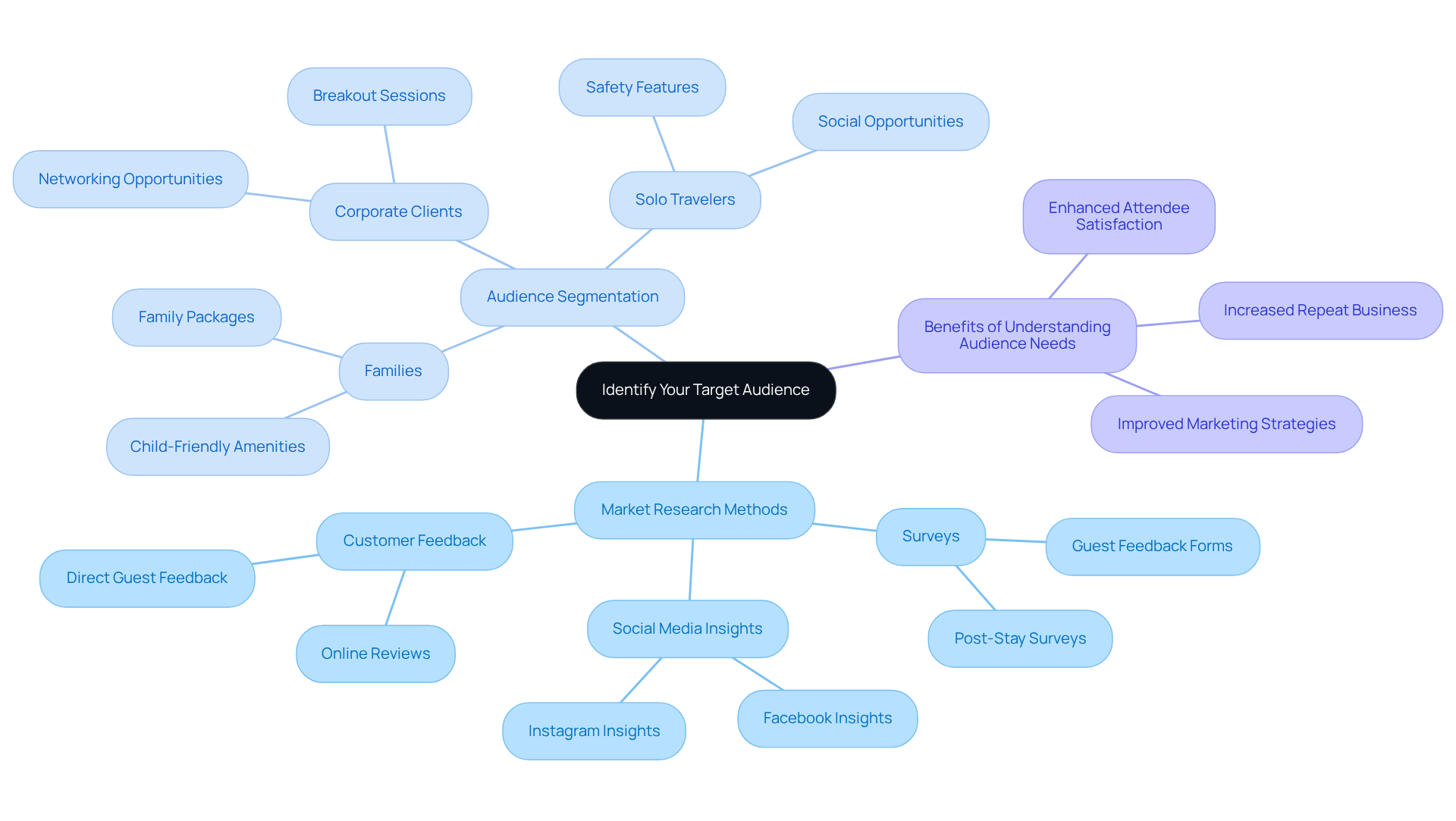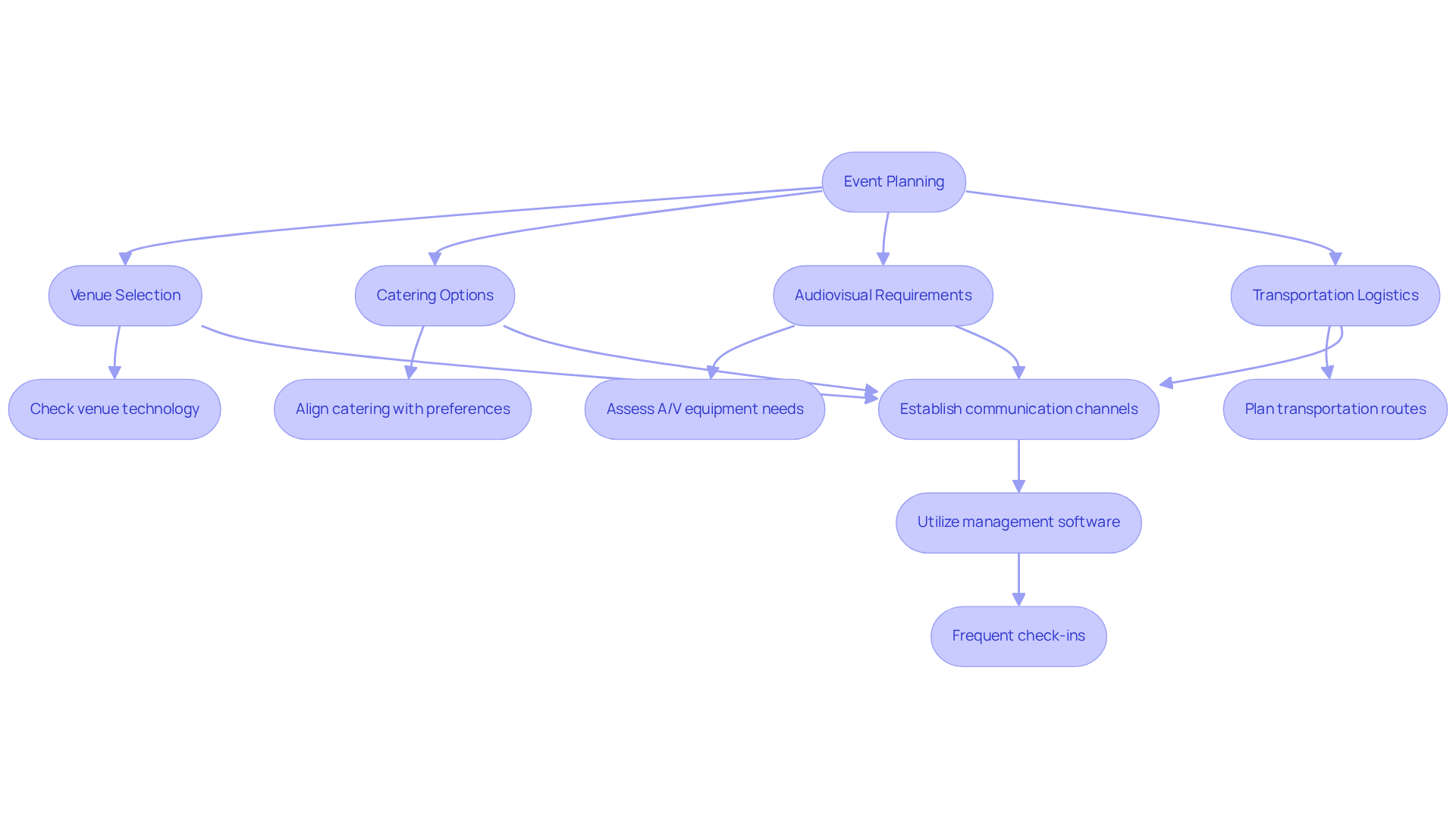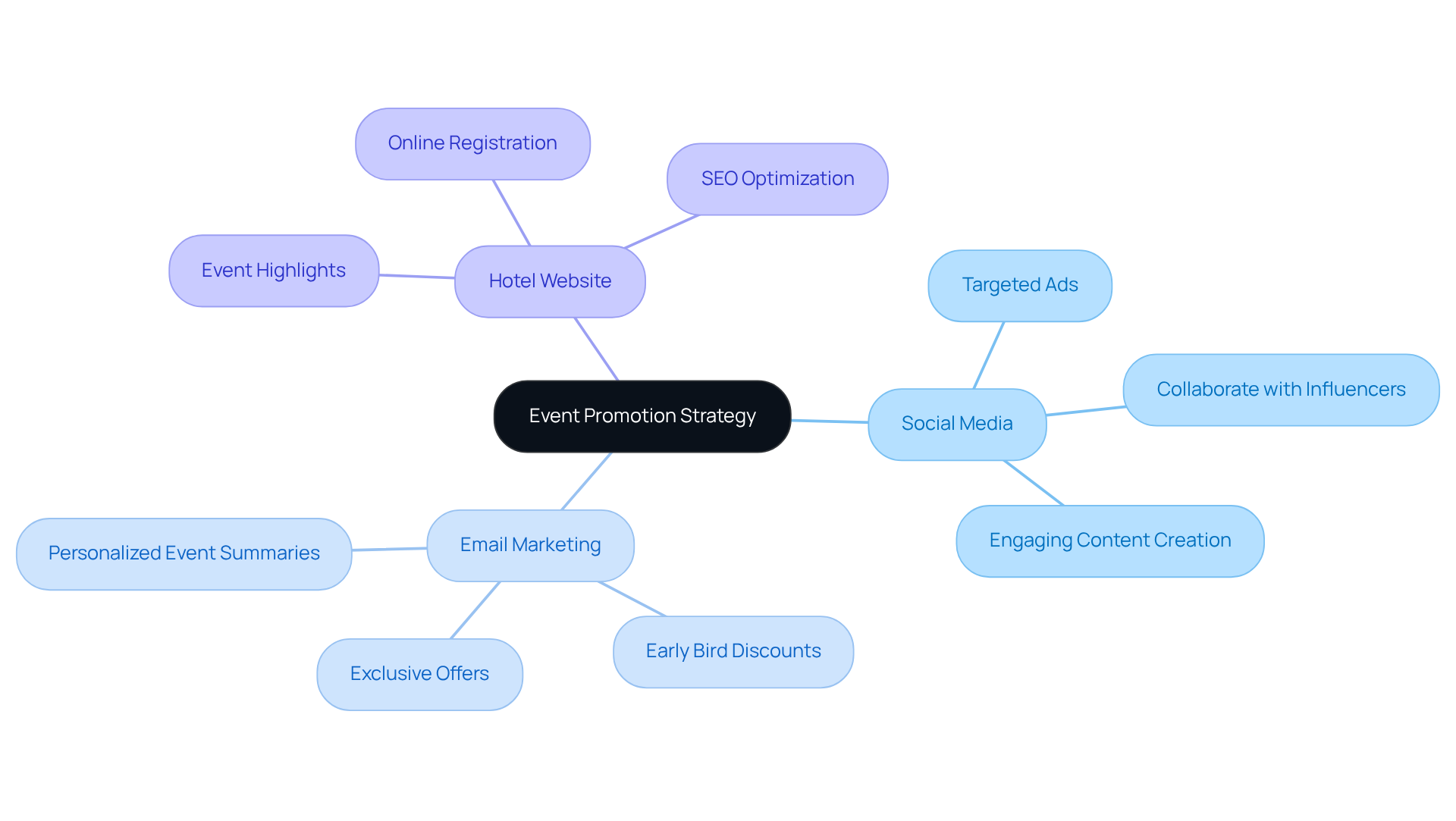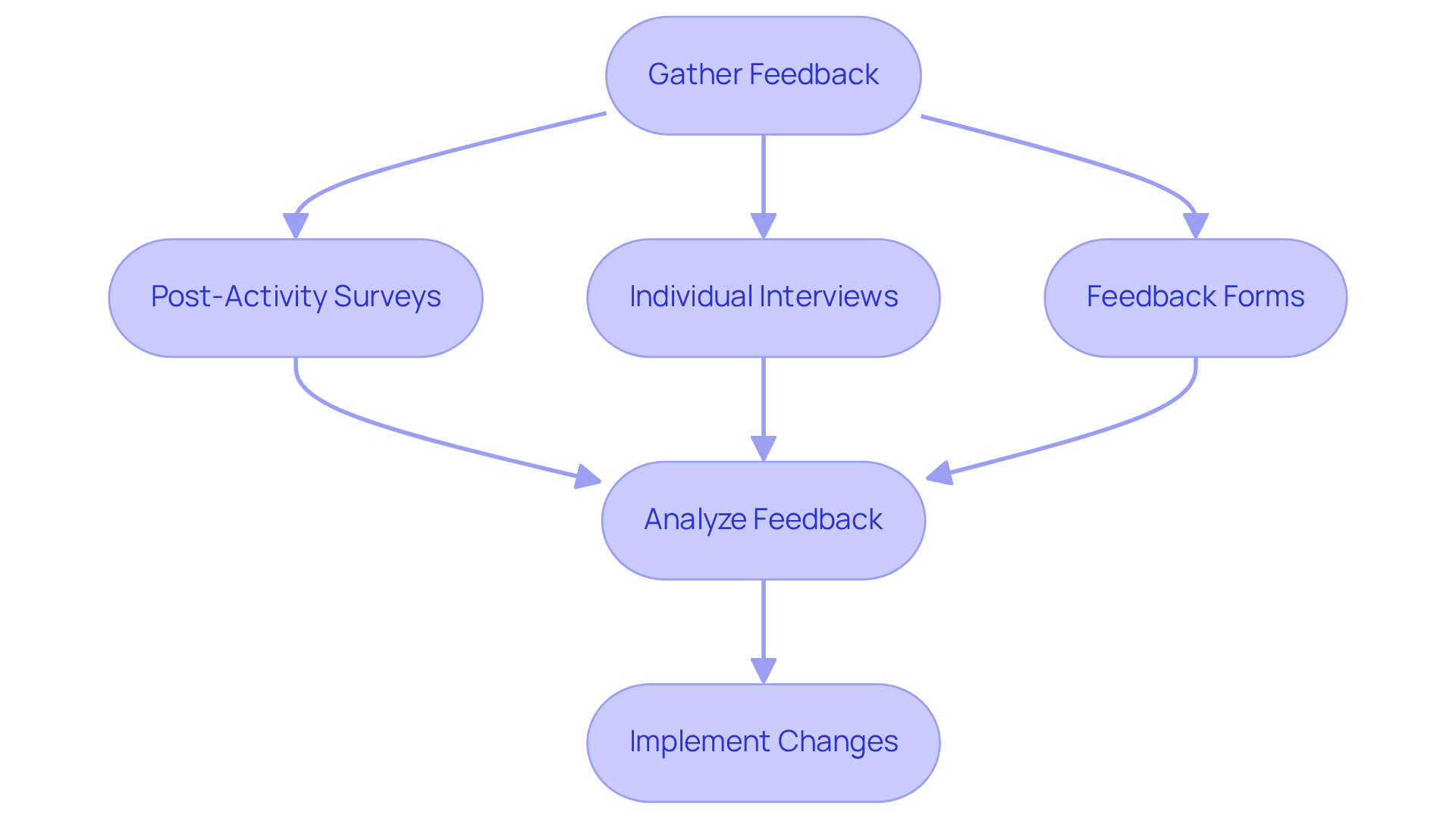The article delineates four essential strategies for executing successful events within hotel environments:
By underscoring the importance of tailored experiences derived from audience insights, precise logistical coordination, multi-channel promotional tactics, and thorough post-event assessments, the article effectively demonstrates how these strategies synergistically enhance attendee satisfaction and cultivate enduring client relationships.
Crafting successful events within hotel settings necessitates more than merely a beautiful venue; it requires a strategic approach that aligns with the diverse needs of various audiences. By leveraging targeted audience insights, meticulous planning, and innovative marketing techniques, hotels can significantly enhance attendee experiences and drive repeat business. However, the challenge persists: how can hotels effectively balance the logistical intricacies of event management while ensuring that each gathering resonates with its intended participants? This article delves into four key strategies designed to transform hotel events into memorable experiences, ultimately setting the stage for lasting connections and success.
To successfully identify your target audience, begin with thorough market research. Conduct surveys, analyze social media insights, and gather customer feedback to collect data on demographics, preferences, and pain points.
For example, if your hotel frequently hosts events for corporate clients, understanding the specific needs of business professionals—such as networking opportunities or breakout sessions—enables you to tailor the event effectively.
Furthermore, segment your audience into distinct groups to create personalized experiences that cater to their unique interests. This targeted approach not only enhances attendee satisfaction but also increases the likelihood of repeat business and referrals.
Recent trends indicate that hotels utilizing detailed guest profiles and audience insights achieve higher engagement rates, underscoring the importance of staying informed about evolving market research methods. Tools like provide valuable data on visitor demographics and behavior, further informing your marketing strategies.

Developing a comprehensive schedule for successful events in a hotel is essential, encompassing all significant milestones from initial planning to post-occasion follow-up. This timeline must account for critical factors such as:
For instance, when hosting a wedding, it is vital to ensure that the venue is equipped with the necessary technology for presentations and that the catering aligns with the couple's preferences. Furthermore, establishing clear communication channels with all stakeholders, including vendors and staff, is crucial for aligning expectations and responsibilities.
Utilizing can simplify these processes, minimizing mistakes and improving coordination. Frequent check-ins leading up to the occasion can proactively address potential issues, ensuring a seamless experience. Data shows that efficient timeline management can significantly enhance the execution of activities; for instance, the Group segment achieved a 102.3% overall health index, demonstrating the beneficial impact of well-structured occasions on satisfaction rates and revenue.
By prioritizing these strategies, hotels can maximize their potential for events in hotel gatherings and foster lasting relationships with clients.

To effectively promote your occasion, it is crucial to adopt a multi-channel marketing strategy that encompasses:
By creating captivating material that highlights the occasion's distinctive features—such as prominent guest speakers or exclusive networking opportunities—you can capture your audience's attention.
Targeted advertising on platforms like Facebook and Instagram will assist in reaching specific demographics, maximizing the visibility of your occasion.
Furthermore, collaborating with local influencers or industry partners can significantly amplify your reach and enhance your credibility.
Consider offering early bird discounts or unique benefits for individuals who register beforehand; this strategy generates enthusiasm and promotes sign-ups, ultimately driving attendance.

Following the occasion, it is essential to establish an organized review procedure to collect opinions from participants. This can encompass post-activity surveys, individual interviews, or feedback forms circulated during the events in hotel. Focus on key areas such as content relevance, speaker effectiveness, and overall participant experience.
For instance, if participants express a desire for additional interactive sessions, consider integrating more workshops or Q&A segments in upcoming gatherings. Analyzing this feedback not only aids in refining your strategy for events in hotel but also demonstrates to attendees that their opinions are valued. This fosters loyalty and encourages .

Successful events in hotel settings hinge on a comprehensive understanding of the audience, meticulous planning, robust marketing, and insightful feedback collection. By focusing on these key strategies, hotels can create memorable experiences that not only meet but exceed attendee expectations.
The article outlines four essential strategies:
Each of these elements plays a crucial role in ensuring events are tailored to specific demographics, run smoothly, attract attendees, and continuously improve based on participant insights.
Ultimately, the significance of these strategies cannot be overstated. Hotels that invest time and resources into understanding their audience and refining their event management processes will not only enhance guest satisfaction but also foster loyalty and drive repeat business. Embracing these best practices can transform hotel events into standout occasions that resonate with attendees long after the event concludes.
How can I identify my target audience?
To identify your target audience, conduct thorough market research, including surveys, social media insights, and customer feedback to gather data on demographics, preferences, and pain points.
Why is it important to understand the specific needs of my target audience?
Understanding the specific needs of your target audience allows you to tailor your offerings effectively, enhancing attendee satisfaction and increasing the likelihood of repeat business and referrals.
What is audience segmentation and why is it useful?
Audience segmentation involves dividing your audience into distinct groups based on their unique interests, allowing you to create personalized experiences that cater to those specific groups.
How can detailed guest profiles improve engagement rates?
Hotels that utilize detailed guest profiles and audience insights tend to achieve higher engagement rates, as they can better meet the evolving needs and preferences of their guests.
What tools can help in gathering audience insights?
Tools like Google Analytics can provide valuable data on visitor demographics and behavior, which can inform your marketing strategies and help you better understand your audience.
Transform your group booking strategies with Lights On and watch your occupancy soar.